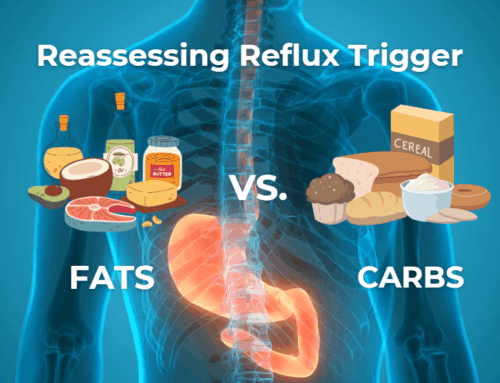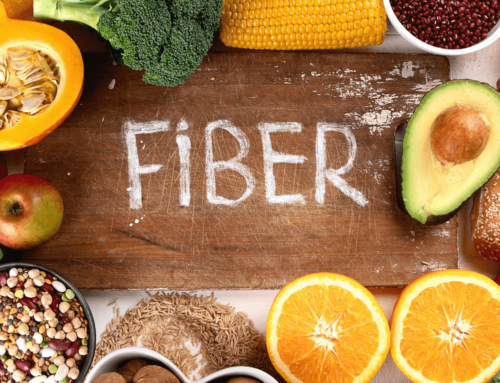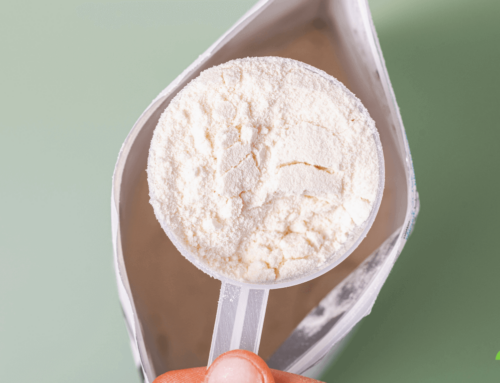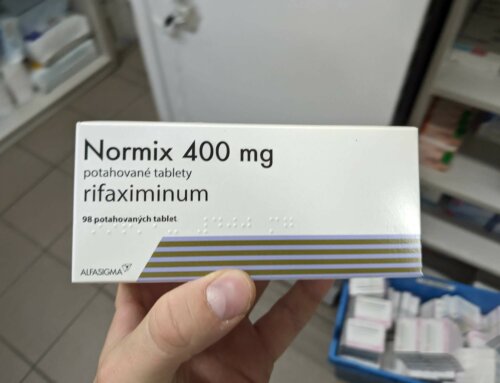Someone recently asked me if small intestinal bacterial overgrowth (SIBO) causes leaky gut, and if so, will the Fast Tract Diet help correct it?”
SIBO is most definitely linked to leaky gut, and the connection goes a long way to explain why SIBO is linked to many autoimmune conditions including:
- Celiac disease
- Hashimoto’s
- Rheumatoid arthritis
- Ankylosing spondylitis
When leaky gut occurs, proteins, protein fragments, toxins, incompletely digested food particles, viruses, whole or fragmented bacteria and their waste products escape from inside the intestines where they come into contact with our immune system whose job is to identify, hunt down and destroy them. Unfortunately, the same immune response can trigger various autoimmune conditions in people who are genetically predisposed to them.
The proposed mechanism is “molecular mimicry” where these foreign proteins or other antigens resemble some of our body’s own proteins. Thus when they elicit an immune response, the reaction also targets our “self” proteins.
The most common test for leaky gut is the lactulose/mannitol small intestinal permeability test. Intestinal permeability (IP) is the medical term for leaky gut. The test is based on the idea that while neither sugar is digestible, mannitol is efficiently absorbed into the blood stream (showing up later in urine) while lactulose, a larger molecule is not. But when the gut becomes leaky, lactulose can escape raising the ratio of lactulose to mannitol in the urine.
Using this test, a study in 1997 evaluated 34 subjects suspected of having SIBO and 34 asymptomatic controls. The subjects with SIBO exhibited increased IP. Increased IP has also been observed in people with a variety of SIBO-linked conditions including fibromyalgia, celiac disease, IBS, another IBS study, post infectious IBS, and Crohn’s disease.
While these studies don’t prove SIBO is the cause of leaky gut, the close association of SIBO with leaky gut and the types of damage caused by SIBO convince me that SIBO likely plays a causative role: therefore, the Fast Tract Diet makes sense for treating and preventing leaky gut.
In the case of celiac disease, the effect of the gluten-triggered autoimmune response that damages intestinal villi structures likely is an independent factor contributing to leaky gut – beyond SIBO alone. The best strategy for someone with Celiac disease is therefore a gluten-free version of the Fast Tract Diet since SIBO is also a big problem for celiacs.
For more information on our mucosal barrier, tight junctions and their regulation by a protein called zonulin, I recommend this great review by Anthony Fasano.







What’s the status of inulin in the fermentation potential universe. I drink a lot of hot chicory beverage (Le roux). I wonder if it’s contributing to my sibo distress.
Hi mguillette, We chose this great question for one of the Q&As. Here’s the link: https://digestivehealthinstitute.org/fast-tract-diet-qa/
Have you learned anything that leaky gut can lead to interstitial cystitis ?
Hi Susan, This would make sense, but I am not aware of specific evidence for this off hand.
Susan, Yes it can according to my Osteopathic doctor. I have been having Chronic UTI issues for the last few months, and also gut issues. My doctor thinks everything is originating from the leaky gut issue, which we are treating first to see if the other health issues resolve. My doctor suggested taking RESTORE a gut health drink, and to take bovine gelatin/collegen from Great Lakes the green bottle. Both of these things can be found on Amazon. :-) Ive been on Restore for a week and so far only positive things have changed, albeit small, my stomach issues seem to be improving without drugs.
Norm,
I keep reading that healing LPR takes longer than GERD. Are there many people with
LPR that this diet actually has worked for?
Hi Jill, There are Amazon reviews on LPR success (one I recall was by Tom for the FTD Heartburn book, but there are many more) as well as success stories on the Fast Tract Diet Official Facebook page. You can also check out the book review tab under the FTD Heartburn.
Hi Norm,
I’m in the process of reading your book, Fast Tract Digestion. Thank you for writing it.
I’m fairly certain I have SIBO and that your book will help me but I’m curious : have you ever heard of bacterial overgrowth extending beyond the small intestine aswell? e.g. to the esophagus or mouth or lips and even skin? I’ve noticed an undeniable correlation between the fermentable type things I eat and the condition of my lips (which can change drastically day by day).
Thanks again,
Seth
Hi Norman,
What do you think about Pimentel’s theory that SIBO is actually autoimmune disease:
It happens when the body is exposed to a toxin, the body then produces antibodies to the toxin and these antibodies not only attack the toxin, they also attack a protein in your gut called vinculin. This is through a process called molecular mimicry. The protein sequences in vinculin resembles the toxin closely enough that the antibodies think vinculin is a foreign invader and begin to attack it. This is an autoimmune condition, where your immune system has produced an antibody that is attacking self.
Where does this toxin come from? The short answer is a food poisoning event.
E. coli, Salmonella, Shigella or Campylobacter all produce a common toxin called Cdt-B toxin (Cytolethal Distending Toxin B). Once exposed to this toxin, some people (not all) will produce antibodies to the Cdt-B toxin. These antibodies will also attack vinculin creating an autoimmune condition.
Where does Vinculin come in?
Vinculin is a protein that connects a network of cells within the pacemaker of the gut, called the Interstitial Cells of Cajal. The pacemaker of the gut does exactly what you think it would, it is the signaling network that signals the coordinated wave like contractions of peristalsis; it sets the pace. Vinculin helps these cells connect and communicate electrical signals to contract your smooth muscle.
If vinculin is damaged or destroyed, it can’t link the cells within the pacemaker and you then can’t transmit the electrical signal to contract your smooth muscle. This stalls gastric motility during meals and in between meals.
Hi Ivan, First of all wow! I am familiar with these well supported research findings from the Pimentel group, but I really appreciate your succinct summary of this work. I think they are on to something for a subset of people with IBS- who experienced food poisoning with one of the Cdt-B positive strains you mention. But there are many other IBS sufferers whose condition was brought about by other means including a variety of other motility disorders, digestive enzyme deficiencies (cystic fibrosis as the extreme example), antibiotic use, lactose or fructose intolerance or simply consuming more fermentable carbs than one’s body can process, particularly as we age. Each of these cases (and others) can lead to SIBO or general dysbiosis and IBS, GERD, leaky gut and other SIBO-related conditions.
Hi Norman,
I read very often about people’s experiences on your diet /on blog comments, forums etc./ – basically your diet seems to suppress symptoms but immediately after people deviate from diet their symptoms returns – this means that they are not cured.
I dont know if you will agree with this. So i wonder why this happens?
Have you seen this study https://www.ncbi.nlm.nih.gov/pmc/articles/PMC4231515/
Hi Ivan, I appreciate your question and concern. In most instances, the Fast Tract Diet or any others that reduce fermentable carbohydrates does not represent a “cure”, unless specific underlying causes in each case are identified and corrected.
Often times, even identifying the underlying cause(s) doesn’t mean it can be 100% reversed. Intestinal scaring from surgery, infection, scleroderma, etc, the genetic deficiency in adult expression of lactase enzyme, low amylase gene copy number, clogged bile duct from cystic fibrosis and other irreversible conditions represent some of the many different health issues that can promote SIBO. There are many more.
In these cases identifying the problem is very helpful because even if the problem cannot be permanently reversed, there are oftentimes actions that will help. Taking lactase enzyme for lactose intolerance while consuming no or low lactose foods, supplementing with amylase enzyme if deficient, and so on. Also some problems such as damage to small intestinal villi from infection, SIBO or inflammation will heal over time if you can intervene in the inflammatory process.
As we age our digestive abilities often decline. Also, we live in an age were our microbiota has been severely impacted by antibiotics and other aspects of modern living. The biggest single problem in my view is that when digestion or the microbiota is impacted, processing carbohydrates becomes more difficult resulting in carbohydrate malabsorption.
Carbohydrate malabsorption fuels SIBO bacteria. The most important first step in addressing SIBO is to reduce the amount of fermentable carbs in the diet. The Fast Tract Diet is built on three pillars; Reducing fermentable carbohydrates, identifying and addressing (as best you can) underlying contributing causes, and incorporating pro-digestion behaviors into your daily routine to ensure that most of the carbohydrates you consume are efficiently digested and absorbed.
A good analogy is diabetes. People with this condition are going on low carb high fat diets to reduce their blood sugar and insulin spikes and can often reduce or stop taking exogenous insulin. Are they cured? No. But their diabetes is under terrific control.
PS: Thanks for the link on the interesting Zinc study. The Fast Tract Diet does recommend a multivitamin with minerals for people starting out on the diet.
Hi Dr. Robillard,
Thanks so much for the book. I extremely helpful..I realizes why I first became plagued with SIBO-methane since 2014. It was because I WAY overdid erythritol for many months. It gave me issues everyday. Things became much better when I stopped but things haven’t been the same since. Also twice since then I have tried to go vegan with a lot of carbs which exacerbated the existing issue.
I can see that eating low carb and healthy fats helps a lot with my SIBO. However, I am longing to go back to my starch based vegan diet. I was just curious if you have seen people on vegan diets manage this condition? Do you suppose it is possible by sticking to low FP options and maybe substituting starches with konjac pasta as often as possible?
Would it possibly be easier to digest the carbohydrates with the help of probiotics and gut healing supplements such as glutamine?
THANK YOU!!
Hi SDhar, I do think the Fast Tract Diet can work for vegetarians, but it takes more than a post to address this. I am working with several vegetarians currently. If you are interested, please contact us via the consultation page.
Have you thought about adding Lyme disease to the list of illnesses associated with SIBO?
How does this diet help with H-pylori?
There is no reason I know of that the Fast Tract Diet, or any other diet will help resolve an infection with H. pylori bacteria. The infection would need to be treated – most commonly with an antibiotic cocktail.